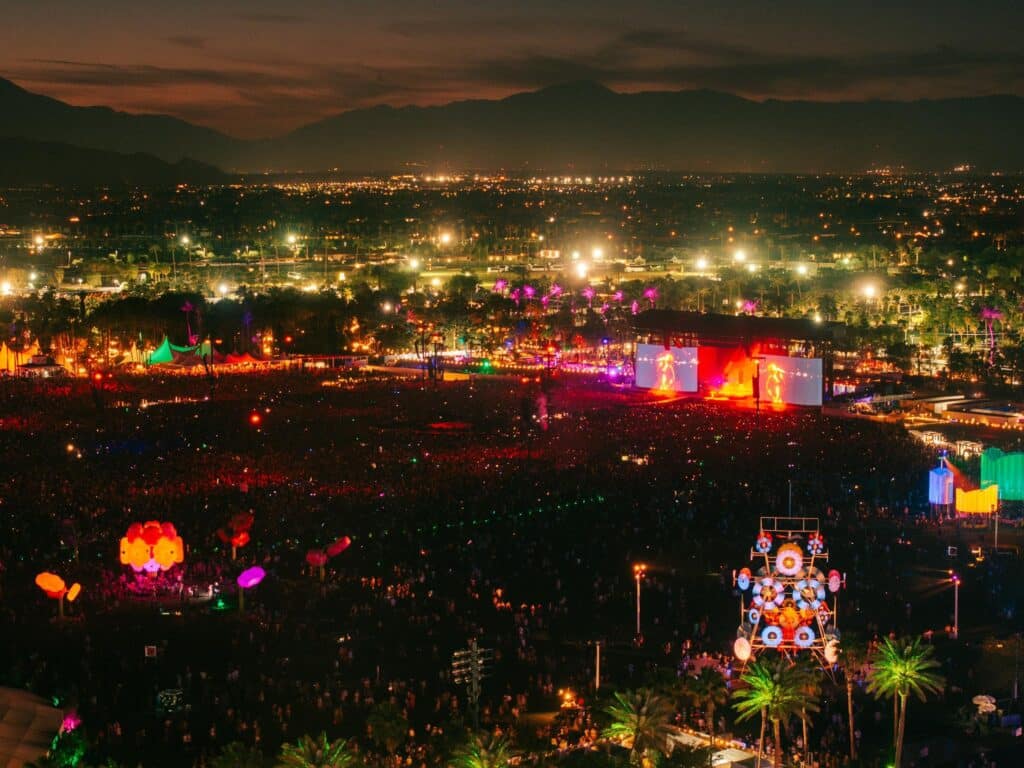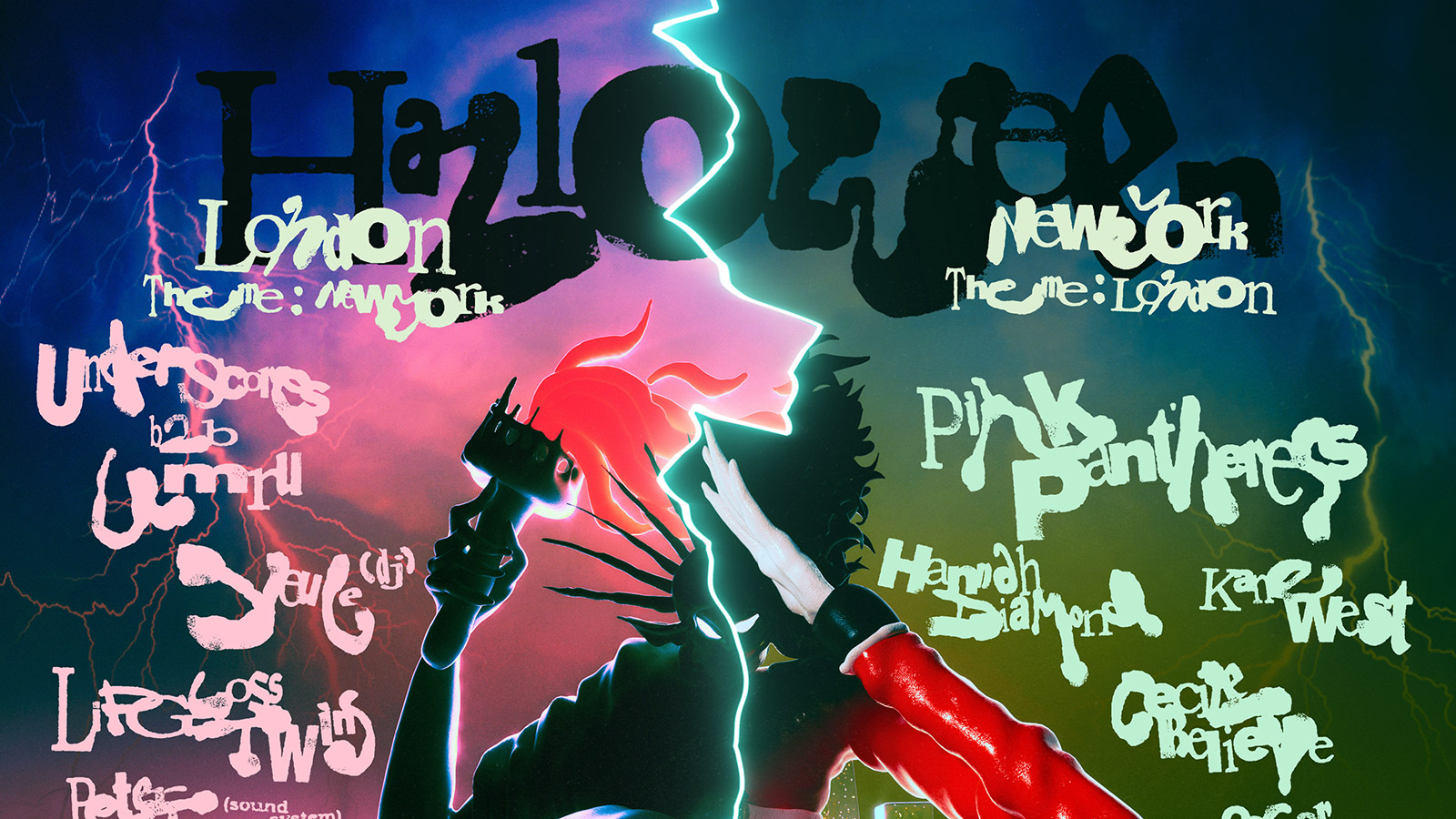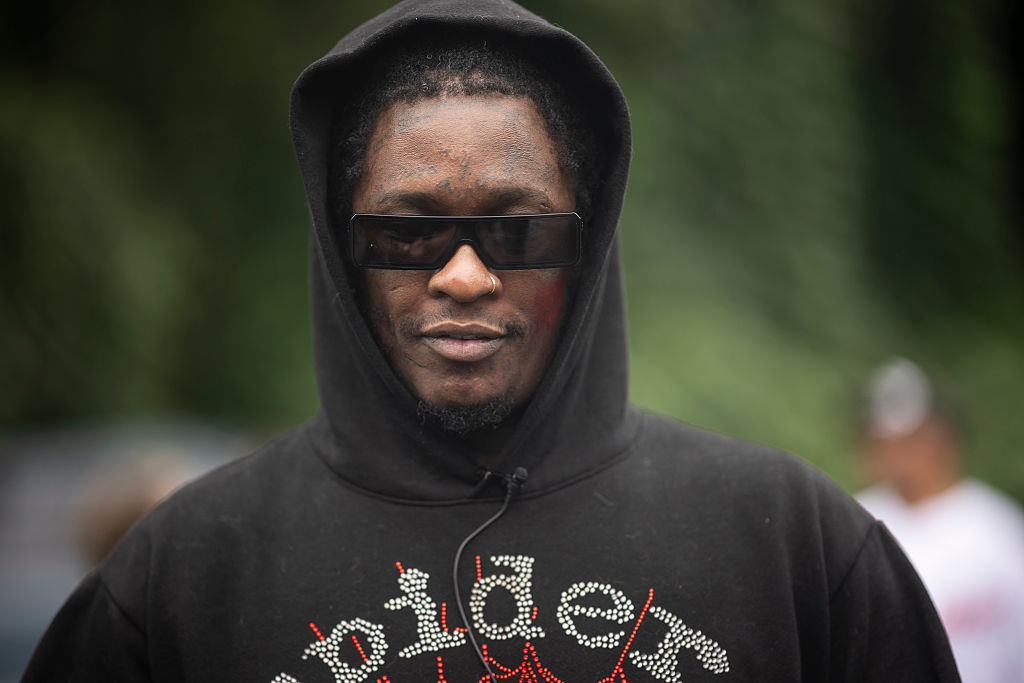

Landscape and stillness are a big part of the musical DNA of Ohio-born Mitch Rowland.
The 36-year old singer/songwriter is now settled in the Hereford countryside with his wife Sarah Jones - together they’re notably the guitarist and drummer for Harry Styles’ band. Roped in as a session guitarist for the former One Directioner’s self-titled debut when someone else dropped out, Rowland ended up co-writing and playing on most of the record as well as signature track “Watermelon Sugar”.
Now a father of two, Rowland’s path to his second solo album Whistling Pie came together in the reflective spaces between the ephemera of parenthood. Notably introspective - as with his 2023 debut Come June – it’s a heavier record in places too.
“If you're gonna live in the middle of nowhere and you own a handful of vintage amps and guitars, you've got to find someone to work on that stuff every once in a while, to avoid being custodian to your own collection,” Rowland tells me. “So I was going from Hereford to Cardiff a lot because I discovered this guitar shop in Cardiff and I would come home with a guitar here, and amp here and those amps and guitars found their way on the record – so there's by far more electric guitar this time. It’s still not a rock and roll record by any means, but there’s just much more guitar playing.”
To make Whistling Pie, Rowland headed to the legendary Rockfield Studios, not far from his home, with Come June collaborator Rob Schnapf as producer and the records of JJ Cale for inspiration. The result as as disarmingly charming and fiercely intelligent as you would expect from a man whose musical epiphanies came from some of the greats of folk and rock n roll.
Talking through the foundational songs that shaped him as a creator and instrumentalist, Rowland’s enthusiasm underpins a commitment to his artistry and a continuing quest to understand and translate the mysteries of the guitar and the sounds it can make.
MITCH ROWLAND: Toys in the Attic was actually my introduction to Aerosmith – just driving around with my dad as a kid in Columbus, Ohio. I remember when he bought that CD – it was probably in the late ‘90s and obviously the record is much older than that, so I was maybe seven or eight.
I know people over here aren't that familiar with baseball, but in Columbus there was a semi pro team – minor league as we call it – The Columbus Clippers. They were affiliated with the New York Yankees and in the ‘90s the Yankees won a handful of championships, and the players from those World Series teams came through Columbus. I grew up at a time when you could buy a $3 ticket and go see these guys play and I wound up with a job as a bat boy when I was about 12 or 13 for the Clippers.
There's probably four or five bat boys at games; you wear a uniform, get a helmet and you watch the lines waiting for a foul ball to come your way and then you scoop it up and discard it. Other bat boys are in the dugout, and they literally go get the bat when the hitter hits the ball, drops it and runs away. So that paid $16 an hour, and I was there for 8-10 hours per game. It was purely for the experience of being around baseball players.
My first day, it was a Sunday afternoon game and you get there early because every game starts with batting practice. So guys are just warming up, catching and throwing, some guys are hitting. And I've got my cleats on, my uniform on, and I walk out on the field that I knew so well growing up – and “Mama Kin” is being pumped out of the PA. It was the best day on Earth. I'd never heard music that I knew so well being played out of a PA system before. And for being 12 or 13, I thought I am definitely doing something right! This is awesome!
BEST FIT: I re-listened to it alongside all of their first record last night and I hadn’t realised just how much his voice changed between then and the ‘90s stuff they did that got huge.
I guess by the time of Toys in the Attic – which was their third record – he was singing the way you think of Steven Tyler. I don't know how old or young he was then, but something changed – like his balls dropped and his voice got higher!
This probably came into my life around the same time as Aerosmith. It was in the years of going to someone's house and they had a drumkit in the basement – drums were my first instrument – and that was my way of connecting with guitar players. I later learned how to play guitar, but that's how I got in with people: everyone has a hard time finding a decent drummer, so that was my way in.
And someone must have put on “The Ocean”... I think the only Zeppelin song I’d been exposed to at that point was on the Chevrolet adverts which used “Rock N Roll”, but I don't think I even knew what that was. It happened around the same time that How The West Was Won came out and that’s obviously just a mind-blowing concert.
Was the influence of British folk music on them something you picked up back then?
Well, what's interesting is how Bert Jansch informs Jimmy Page; Jimmy Page hooks up with The Black Crowes; Nick Drake informs Rich Robinson of The Black Crowes... and then this band called the Buffalo Killers – who I’ve also picked – went on tour with The Black Crowes.
The first time I went to see Neil Young my dad and I went to the Le Noise tour, which is the solo electric album he made with Daniel Lanois. It was mostly solo electric but with an occasional acoustic song; mostly [he played] the Les Paul and a White Falcon, all by himself. And Bert opened up for him.
It’s not all the time that the opener is on the ticket stub, but that was back when you actually had the ticket months in advance, and he was listed on there. I looked at it for months, but I never bothered to find out who Bert Jansch was – it was just a name I didn't know, but it turned out to be one of most important shows I ever saw.
I kind of remember it more than Neil’s set; Bert, I think, had cancer at the time, so he was on his way out and I think he might have gone a few months later, but I was mesmerised up there on the balcony. It was hauntingly good, and I filed it away. I didn't buy the records, [but] it had the impact it had, and I knew that I would come back around to it at some point, which was probably when I was living in London between 2017 and 2020.
Those days were pre-children, so I was in record stores all the time and picked up Rosemary Lane and “Tell Me What Is True Love” is the first song. The same thing happened like when I heard “The Ocean”, but I'll probably have “Tell Me What Is True Love” played at my funeral. It’s my favourite song of all time.
And what's annoying about Bert is he plays in alternate tunings, but when I went to learn this song, what I found that it’s in standard tuning, but because he's Bert and he's so good, he makes it sound like it's an open tuning. He finds all the droney spots where there shouldn't be droney spots, you bastard!
I know you've played with Ben? He was on your first record?
Yes, he was on the first album Come June and then spinning off of that record live, he'd pop up too. There are certain songs that teach you how to play and this is one of them: I can't remember fingerpicking before I heard this song.
I saw him in 2006 in Columbus and didn't know who he was, but a friend had a spare ticket and I went along. He was touring the Both Sides of the Gun album, which is a double album – the first half is acoustic and the second half is electric. It's one of my favourite records of his, which may be a bit partial to the point of entry and how I discovered it.
“Morning Yearning” is the first song on the record – it starts with the acoustic bit – and there are certain songs that decide what kind of musician you're going to be and where you might take that. Hearing this was definitely like a seed planted in my playing, or songwriting, whatever you want to call it… it decided where I might go. Life is terrifying in that way.
I read somewhere that Ben also used George Harrison's lap steel on your song “All the Way Back”?
He played on that song and brought an array of stuff with him, including George’s Rickenbacker Lap Steel. I think George had passed at that point, but Ben had made a record with Dhani Harrison around 15 years ago when they were in a band called Fistful of Mercy with this other songwriter Joseph Arthur. Maybe that's where the exchange happened.
How do you approach it as a musician when you come into contact with an object that has that kind of legacy?
It’s such a treat to hear it… I don't know what George used it on but it's just a treat to be in the room hearing those things straight from the source. When we were making the first Harry Styles record, we were working out of The Village in LA and in the room next door I think they were trying to make a new Fleetwood Mac record, and Stevie wasn't turning up… so I think it ended up being a Buckingham / McVie record. But when they weren't in there, I walked in to see Mick’s kit just to kind of look at it. I don't need to play them to get the full effect, I'm happy to just look and observe and listen or whatever.
Your new record was made in Rockfield in Wales, which also has an incredibly legacy.
I think by the time you've loaded in your stuff, it turns into a workspace, but we took a tour of Rockfield months before getting Rob out there [producer Rob Schnapf] and you look at the empty room and try to imagine the arguments that happened in there.
There’s two studios and the other one was the (What's the Story) Morning Glory? studio, and there's the wall that Noel sat on top of and wrote “Wonderwall”... it's a stone wall, you know?! But you look at who's been at Rockfield, and it's longer than the opening Star Wars scroll!
This song is from the Warpaint album, and The Black Crowes are a little bit associated with my first musical memory. My dad had a friend who had a bachelor pad at the time, and instead of a living room with a sofa and a TV, he had a pool table and an old jukebox with stuff from Shake Your Money Maker on it and the singles from the first Black Crowes record.
I wound up with a pair of tickets to see them and took my dad in 2008 and sort of rediscovered them and fell in love with them again. That record Warpaint – and that song “Wee Who See The Deep” as well as the Buffalo Killers song – are my two “I don't know what to do” songs, meaning if we’re waiting around and it's soundcheck and I put the guitar on and I don't really know what to do, I'm probably gonna play this song or the riff from “It’s A Shame” by the Buffalo Killers.
“Wee Who See The Deep” kind of reminds me of Funkadelic – it's like rockin and riffy and it's in standard tuning. When I started writing songs for myself, I was diving into alternate tunings to the point where I didn't know how to play in standard tuning anymore, which sounds silly, because that's the tuning everybody knows how to play guitar. I call these songs my social cigarettes because I didn't know how to just stand there and be comfortable, so I play these songs.
Rich Robinson actually learned open turning from listening to Nick Drake too?
So many guitars he's played over the years are Ronnie and Keith guitars, so many of the Crowes songs are in open G or open F, you know, a little bit lower – but he cites Nick Drake, who played in like a hundred tunings across three albums! But that was also my point of entry for Nick's music back when I was a teenager, thinking that he was some obscure artist when it was no stupid, he's the 101 of acoustic, folk, the godfather of indie rock, or whatever you want to call it!
The Buffalo Killers are two brothers and their friend Joey on drums. They're from Ohio – probably an hour and a half from where I grew up – and they primarily played bars and travelled in a van.
They opened up for The Black Crowes and other people over the years and although they’ve kind of put that to bed now, they’re still heroes of mine, just an awesome rock and roll band, a great fuzz power trio. I would never miss a show whenever they were playing between Columbus or Cincinnati.
Andy, the guitar player from the band, is why I got into playing Gibson Firebird guitars. He and his brother… I guess the backstory with them is that their second album Let it Ride – which is what “It's A Shame” came from – it’s produced by Dan Auerbach, back when I think Dan was still living in Ohio, before The Black Keys became famous when they were still a van band.
Fast forward to a couple of years ago and The Black Keys are a full band live with the two brothers from the Buffalo Killers playing with them; so with Andy on guitar and Zach on bass. I don't think he's touring with them anymore, but it was pretty cool to see my local legends on the big stage.
There was one show in particular where I got to open up for them in Ohio. My name was on the ticket stub under theirs, and at the time I didn't really dream much bigger than that, so everything else I wound up doing was unforeseeable. Ohio is a little bit of a dead end I suppose in terms of live music. You either stay there and do your thing and you’re content with that – or you get out. But these guys made it work somehow.
Does it ever seem surreal to you that you're making music that has such a peculiarly English feel to it as a kid from Ohio?
I never thought about it, but most of the music I write is when I'm in the countryside, so I guess having space must play a part. When we're travelling a lot I'll take voice notes of this and that, and oftentimes it's coming back home and getting those songs on the table and cutting them open and having the clarity to finish ideas in that space.
I hate to say that I can only write in one place, because that sounds silly, but a lot of the time things come together when I disconnect.
Do you know the Massey Hall record from 1971? “Don’t Let It Bring You Down” is on that record – in that show – and he’s kind of workshopping a lot of stuff that wound up on Harvest.
“Don’t Let It Bring You Down” is actually on After The Goldrush, but I prefer the version that he does on this live show. I don't know how many guitars he's using in that show, but it’s one or two, because you hear him tuning down instead of just grabbing a guitar that's tuned to that.
So this is an a-ha moment for me! It's tuned down! I must have been 19 or 20 when I heard it and I went; Oh I didn't realise you could play in different tunings?! And why does this song kind of roar the way it does? Why do those chords sound the way they do? I guess in my music, rather than living in E, I go down to C or D, and it works a little better for my vocal range. So this song was my entry point to alternate tunings.
I just saw him play in Hyde Park. He does not give a fuck. He's not changing the songs; he doesn't change the keys. It's cool to see Micah Nelson on guitar too – that was the first time I'd seen him with Neil and all the other guys. I guess it's basically Promise of the Real without Lukas Nelson!
Whenever I’m talking about Nick Drake, I like to bring up a story from when we made the first Harry Styles record.
We went to Jamaica, and one night we took a drive over to Goldeneye, Chris Blackwell's spot, and had dinner. I would have been so much more starstruck at the time if I’d known he had signed John Martyn and Nick Drake. And then I later found out that those guys were great drinking pals.
To know at that moment that somebody put those records into the world? It would have been mind-blowing to be sat across from that guy – but instead, it was equally mind blowing that he got behind Bob Marley too.
Nick Drake always stands out to me a songwriter’s palette cleanser. It reminds me that a song can be anything. “Pink Moon” is a couple lines, one riff, that's it! I think that's good to remember sometimes when I obsess over arrangements. I mean, ultimately, you try to listen to the song and what it's trying to tell you, and you listen to where it's trying to go.
And sometimes you take your favourite song and try to work out the arrangement of that song, and if you stay up late enough one night trying to put something together, you might be going down the wrong hole. But this song kind of says: fuck that whole idea!
What are your other palette cleansers?
When I actively use Bert’s music as an influence or a shoulder to lean on, it helps me to be myself again. When I try to come up with Bert-like stuff, it's not Bert at all and I kind of find out my sound a little bit in imitating somebody else. I also put The Black Crowes to recalibrate.
Mott the Hoople is from Hereford, so that brings a little familiarity to the random spot in the world that I live in. It's just one of those songs. even if I’m two beers in and I hear that song, I might be prone to crying. And I love the Bowie version too, because he mentions stealing clothes from Marks & Sparks too, and to work that into a song is brilliant. It’s just a good song, great guitar playing, great chord changes, great singing, great lyrics. Can I add a tenth song as an honorary mention
Sure!
I was doing the nursery drop off, driving around Herefordshire and I’d just finished listening to the new Wilco album at the time, the one produced by Cate Le Bon. It just finished and Spotify was doing its thing, and I was hitting skip, skip, skip. And then this song came on and my hand was about to hit it, but I let it play, and it stopped me in my tracks. It's called “Lose It All” by Lost in Lona.
I think they're Swiss, because I read that they record in Basel. They’re so small it’s hard to find out anything about them, but I started following them on Instagram, and they followed me back and I’d love to do something with them!
Whistling Pie is released on 12 September via Erskine Records / Giant Music

 3 days ago
10
3 days ago
10


















 English (US) ·
English (US) ·